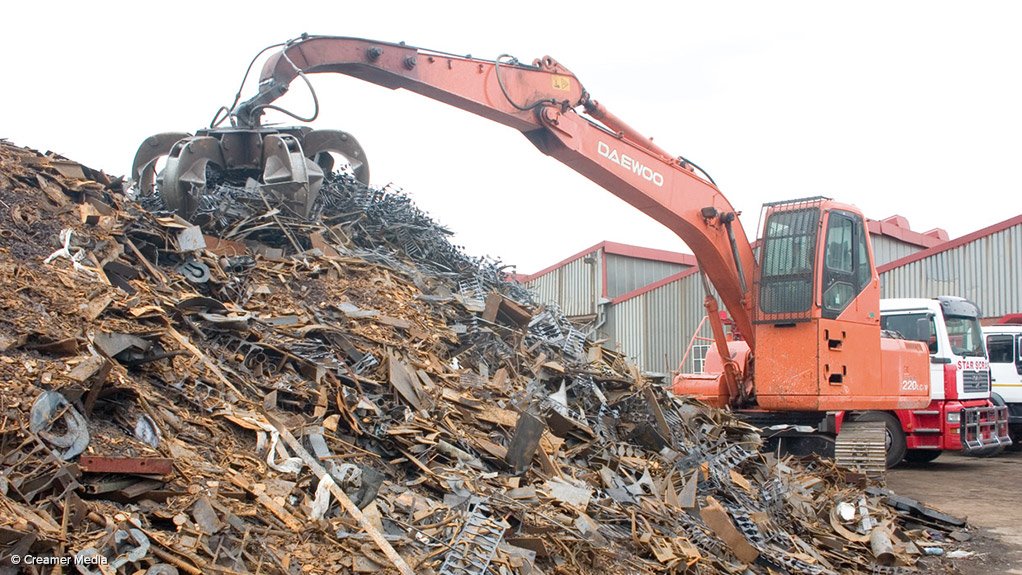Enhanced regulation, law enforcement needed to combat scrap metal theft
Enhanced regulation and enforcement are needed to address the challenges of scrap metal theft in South Africa and potentially lift the ban on scrap metal exports, research and advisory firm Birguid analyst Noquele Dube says.
She explains that the scrap metal industry contributes R15-billion to South Africa's gross domestic product and employs about 350 000 people, according to the Metals Recycling Association of South Africa (MRA).
More than 60% of scrap metal revenue is generated from the mining, manufacturing and construction industries. Scrap metal is the combination of waste metal, metallic material and any product that contains metal that can be recycled from previous consumption or product manufacturing.
Valuable scrap metals in South Africa include copper, aluminium, steel and lead owing to their high demand, limited availability and economic value.
In 2023, South Africa's scrap metal exports totalled R5.2-billion, with manganese at R2-billion, iron and steel at R1.6-billion and aluminium at R1.1-billion accounting for 80% of the exports, Dube says.
Leading markets for these exports included India, at R1.6-billion; Japan, at R1.1-billion; the US, at R707-million; and China, at R322-million, she says.
Dube notes that, contrary to expectations of a ban on exports, South Africa instead imposed a ban on its own goods.
In November 2022, the Department of Trade, Industry and Competition (dtic) implemented an export ban on ferrous and copper scrap metals. This measure was aimed at combatting copper and ferrous metal theft by eliminating a market for stolen goods and lowering prices to discourage theft.
“Theft and export of copper cables have adversely affected the economy, leading to power cuts and disruptions on rail lines. The ban, initially set from November 2022 to May 2023, was extended for an additional six months until December last year owing to its continued adverse impact on the legal copper industry and its failure to curb illicit exports or money laundering of illegal copper proceeds domestically or internationally,” Dube points out.
According to the dtic, the yearly economic ramifications of copper theft from South Africa’s rail and electricity infrastructure exceed R47-billion. This adversely affects economic growth by disrupting supply chains and elevating production expenses.
Furthermore, service delivery experiences setbacks, with damaged rail lines stemming from theft, resulting in train cancellations and delays.
“The ban on scrap metal exports has impacted South Africans who mostly rely on selling legal scrap metal and waste pickers who collect scrap metal. In 2023, their incomes likely decreased owing to reduced demand for scrap metal from global markets such as the European Union (EU) and Asia, affecting the availability of scrap metal for sale by waste pickers and sellers,” Dube says.
Consequently, South Africa experienced a 38% decline in its scrap metal exports. Being a net exporter of scrap metals, the country exports at least R4.5-billion worth of scrap metals yearly. The ban significantly impacted on the scrap metal trade, including nonferrous metal exports.
Specifically, exports of nonferrous metals such as lead, aluminium and zinc recorded decreases of 39%, 33% and 17%, respectively. India, which accounts for more than 30% of South Africa’s scrap metal exports, reported a 43% decrease from R2.7-billion in 2022 to R1.6-billion in 2023, primarily owing to reduced exports of scrap copper and ferrous metals.
Dube says key participants in the scrap metal industry, such as ArcelorMittal South Africa and Insimbi Industrial Holdings, have faced significant repercussions from the ban on ferrous and copper scrap metal exports.
For example, because of the ban, Insimbi reported a 5% decrease in revenue, from R6.1-billion to R5.6-billion, with the ferrous division being the most affected. In October 2023, Insimbi also reported lower profits and a 95% decrease in cash generated for the six months ended in August, as it grappled with the effects of the ban on the exports of ferrous and copper metals.
“The country might implement stricter regulations and enforcement measures to combat scrap metal theft. This may include requiring sellers to provide identification and proof of ownership for scrap metal transactions, as well as increasing penalties for illegal activities,” Dube suggests.
For example, the South African government may look to the Scrap Metal Dealers Act in the UK, which requires scrap metal dealers to be licensed and imposes fines or imprisonment for noncompliance, she adds.
In addition, the South African government and industry could increase public awareness about the impacts of scrap metal theft and the importance of reporting suspicious activity.
“Engage with local communities, businesses, and law enforcement agencies to foster collaboration in combatting the problem. For example, the Scrap Metal Theft Awareness Programme in the US educates the public about the consequences of scrap metal theft and encourages community involvement in prevention efforts,” Dube explains.
Further, she encourages collaboration with industry stakeholders, including scrap metal dealers, manufacturers and recycling companies, to develop solutions and share best practices for preventing theft and promoting responsible practices.
“The Scrap Metal Dealers Association of South Africa, the South African Police Service, the Metals Recycling Association of South Africa and business may all come together to coordinate efforts in combatting metal theft and promoting industry standards,” Dube says.
Article Enquiry
Email Article
Save Article
Feedback
To advertise email advertising@creamermedia.co.za or click here
Announcements
What's On
Subscribe to improve your user experience...
Option 1 (equivalent of R125 a month):
Receive a weekly copy of Creamer Media's Engineering News & Mining Weekly magazine
(print copy for those in South Africa and e-magazine for those outside of South Africa)
Receive daily email newsletters
Access to full search results
Access archive of magazine back copies
Access to Projects in Progress
Access to ONE Research Report of your choice in PDF format
Option 2 (equivalent of R375 a month):
All benefits from Option 1
PLUS
Access to Creamer Media's Research Channel Africa for ALL Research Reports, in PDF format, on various industrial and mining sectors
including Electricity; Water; Energy Transition; Hydrogen; Roads, Rail and Ports; Coal; Gold; Platinum; Battery Metals; etc.
Already a subscriber?
Forgotten your password?
Receive weekly copy of Creamer Media's Engineering News & Mining Weekly magazine (print copy for those in South Africa and e-magazine for those outside of South Africa)
➕
Recieve daily email newsletters
➕
Access to full search results
➕
Access archive of magazine back copies
➕
Access to Projects in Progress
➕
Access to ONE Research Report of your choice in PDF format
RESEARCH CHANNEL AFRICA
R4500 (equivalent of R375 a month)
SUBSCRIBEAll benefits from Option 1
➕
Access to Creamer Media's Research Channel Africa for ALL Research Reports on various industrial and mining sectors, in PDF format, including on:
Electricity
➕
Water
➕
Energy Transition
➕
Hydrogen
➕
Roads, Rail and Ports
➕
Coal
➕
Gold
➕
Platinum
➕
Battery Metals
➕
etc.
Receive all benefits from Option 1 or Option 2 delivered to numerous people at your company
➕
Multiple User names and Passwords for simultaneous log-ins
➕
Intranet integration access to all in your organisation




















